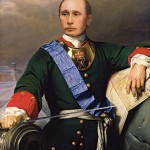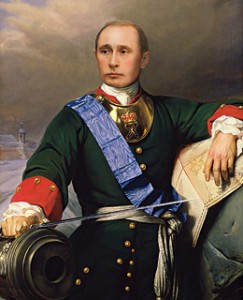
READERS’ GAZETTE—
Dear Editors:
Read with great interest your forthcoming book notices. Seems like Punto Press is on a roll!

V. Putin as seen by TIME Magazine in 2009. (Photo-illustration; Painting of Peter the Great: Getty; Putin: Sergei Guneyev / RIA-Novosti for TIME)
Having lived much of my life in what used to be called “Mitteleuropa”, I remain fascinated by the ebb and flow of powers on the map of Europe, certainly one of the great theaters of history, and one likely to continue among the epicenters of cultural, scientific and political currents in the modern world, along with America and the rising Asian powers. In my view, no matter what the US does—short of blowing up the whole world, which at times, as Mr. Craig Roberts so persuasively argues, it seems on the brink of doing, the 21st Century will be a multipolar world, one in which Russia will play an increasingly determinative role. (Please see, The Ultimate Target is Russia)
It’s for this reason that I thought Mr. Roberts’ warnings about the encirclement of Russia, the perennial harassment of this great nation by reckless politicians and media in the US, no doubt a reflection of their ruling circles’ agenda, were of maximum importance. The US leaderships is clearly embarked on an insane course that can only devolve into a major global conflagration, and since Israel is bound to be involved…Armageddon itself?
The obsessive warmongering we hear from the highest pulpits of opinion in the United States is unconscionable, much of it incongruously kindled by heated rhetoric originating in Israel—well, a sector of Israeli society, their ruling class. For I know that most Israelis, as well as world Jewry itself, comprise a nation of intelligent people with many brave activists for peace. They are not represented in this maniacal game any more than those who stood in the US in opposition to American imperialism during the Vietnam War years. Much too often, in nations where pseudo-democracy applies, what the leaders say cannot and should not be taken to mean the will of the people.
In any case, I thought you’d be interested in what Madeleine Albright had to say about Putin. She can’t deny the truth about this man, but it’s clear that even in 2008 the American leadership saw Putin as someone likely to give them some headaches, not easily corruptible like a Yeltsin, or the kind of fellow to roll over like the British, French or Italian politicians, who of late, behind the NATO mask, have become little more than pathetic appendages to Washington’s power plays around the world. Please note how Albright sprinkles her Putin portrait with those insidious smug comments and adjectives that come so naturally to American propagandists, the kind of language that all top-tier US politicians are so prone to use, one might say it’s one of their sine qua non attributes. Albright’s words are diplomatic enough—after all she was writing as a former U.S. Secretary of State, but the poisons are still there. Obviously, in the American propaganda canon, US leaders do not subjugate lesser powers, they are not cold and calculating, and they have so much respect for the people…I could go on, but the excerpt is clear enough and besides you are probably a lot better at this than me!
Still, I could not contain myself and have bolded the words that stuck in my crow the most:
“Putin is more likely to define his job than be defined by it. After our first meetings, in 1999 and 2000, I described him in my journal as “shrewd, confident, hard-working, patriotic, and ingratiating.” In the years since, he has become more confident and — to Westerners — decidedly less ingratiating.
Some believe Putin’s KGB background explains everything, but his allegiance to the KGB is in turn explained by his intense nationalism — which accounts for his popularity in Russia. Timing matters in history, and Putin has had the benefit of high oil prices and the contrast with his predecessor, Boris Yeltsin. His vision of Russia is that of a great power in the old-fashioned European sense. Such powers have spheres of influence and subjugate lesser powers. At home, they celebrate national traditions and prize collective glory, not individual freedom.
Tolstoy described the 19th century count Mikhail Speransky as a “rigorous-minded man of immense intelligence, who through his energy…had come to power and used it solely for the good of Russia.” What one found disconcerting, though, “was Speransky’s cold, mirror-like gaze, which let no one penetrate to his soul [and] a too great contempt for people.” It is possible to love the idea of a nation without caring too much for its citizens.
It is unlikely that Putin, 55, will wear out his welcome at home anytime soon, as he has nearly done with many democracies abroad. In the meantime, he will remain an irritant to NATO, a source of division within Europe and yet another reason for the West to reduce its reliance on fossil fuels.
Miklós Kovacs
Brooklyn

